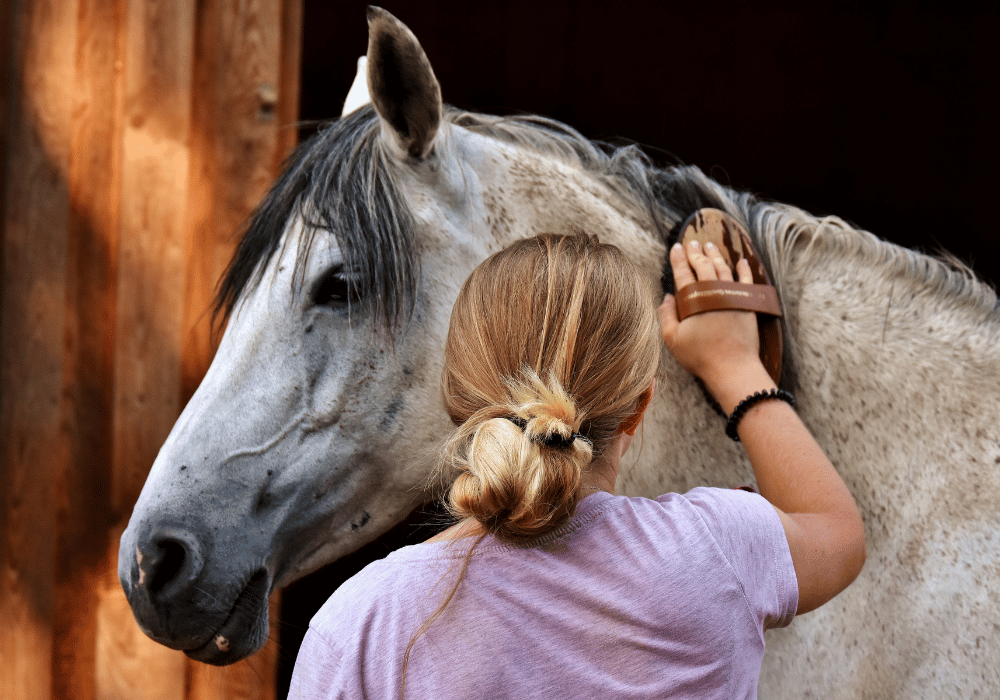Equine herpesvirus (EHV) is highly contagious, and it can cause respiratory or neurological disease. Occasionally, EHV can result in abortion (miscarriage) in pregnant mares. There are nine strains of EHV, with EHV-1 and EHV-4 being the most common. This guide outlines the symptoms of the respiratory and neurological forms of the virus, as well as what horse owners can do to minimise the risk of EHV to horses.
Types of Equine Herpesvirus
There are nine strains of EHV, with EHV-1 and EHV-4 being the most common. The different strains of EHV can cause different forms of the disease. Respiratory disease is the most common form of EHV, and this can be caused by either EHV-1 or EHV-4. EHV-1 can also cause neurological disease. However, this is less common than respiratory disease, and outbreaks are rare. Both EHV-1 and EHV-4 carry the risk of abortion in pregnant mares.
EHV-1 and Respiratory Disease in Horses
Respiratory disease caused by EHV-1 tends to affect younger horses and foals. Provided there are no complications, most horses will usually make a good recovery within a few weeks. However, EHV is more likely to be fatal for young foals.
Symptoms usually appear 4-6 days after the horse is infected. However, this is not always the case. Horses can begin showing clinical signs after 24 hours, or several days after infection.
The symptoms of EHV respiratory disease are similar to equine flu and include:
- High temperature
- Dry cough
- Nasal discharge
- Loss of appetite
- Poor or reduced performance
- Lethargy
EHV-1 and Neurological Disease in Horses
Outbreaks of the neurological form of EHV are rare. However, EHV-1 can cause severe disease of the nervous system, which can be fatal. Depending on the severity of the infection, recovery may take several months. In severe cases, the kindest option may be to have the horse euthanised.
The clinical signs of EHV-1 neurological disease include:
- Weakness
- Inability to pass droppings or urine
- Poor limb coordination
- Inability to stand (in severe cases)
EHV and Abortion in Pregnant Mares
EHV-1 and EHV-4 can cause pregnant mares to abort their foals. Further information and advice on how to prevent and manage a suspected or confirmed outbreak of EHV in pregnant mares is available from the International Codes of Practice 2022.
Your vet will be able to advise you on EHV vaccination for your mare.
What Can Horse Owners Do About Equine Herpesvirus?
Whilst EHV can be a source of worry or alarm for horse owners, there are steps you can take to help prevent some types of equine herpesvirus and minimise the spread should an outbreak occur. Vaccination, routine biosecurity and knowing when to call your vet are all important in minimising the risk.
EHV Vaccine for Horses
There is a vaccine available for respiratory disease and abortion caused by EHV-1 and EHV-4. However, there is currently no registered vaccine for EHV-1 neurological disease. Having your horse vaccinated can help prevent the respiratory disease and abortion caused by EHV. Furthermore, it can help reduce the amount of virus shed by a horse that is infected with EHV, which can help reduce the risk to other horses. Vaccination against EHV is especially recommended to horses under the age of five as they are particularly vulnerable to EHV-1 respiratory disease.
Our equine vets can advise you on vaccinating your horse against EHV-1 or EHV-4. If you are planning on breeding from your mare, our equine stud vets can advise on EHV vaccination and care of your broodmare and foal as part of our equine stud medicine and AI services.
Biosecurity
Whilst vaccines are important in the prevention of infectious diseases such as EHV, effective biosecurity and hygiene measures are also key. Yards should have routine biosecurity protocols in place, including a quarantine procedure for new arrivals and a plan for how to manage an infectious disease outbreak.
Equine biosecurity and hygiene are important even when there is no active disease outbreak. Practising biosecurity as a matter of routine can help minimise the chance of horses being infected. Furthermore, it can also make it easier to respond effectively should the need for more stringent measures arise.
Ensuring that each horse has its own tack, grooming kit and feed and water buckets is one way in which horse owners can practise good hygiene. Also, not allowing your horse to share water troughs or interact too closely with other horses when away from the yard can also help reduce the chance of them bringing an infectious disease back to your yard.
Please see our guide to equine biosecurity for more information on routine biosecurity measures for equestrian yards and businesses. Furthermore, you can check out our case study on biosecurity in action for an example of excellent biosecurity in practice. Our equine vets can advise horse owners, yard managers / owners and stud farms on effective biosecurity protocols.
When to Call Your Vet
Recognising the symptoms of EHV and calling your vet immediately means your horse can receive veterinary attention and treatment as soon as possible. It also allows the prompt implementation of biosecurity protocols. Whilst EHV can be a source of alarm for horse owners, it is important for all parties to remain calm and communicate effectively.
Avonvale Equine Vet Practice | Independent Equine Vet Practice
We are an independent equine vet practice based in Ratley, near Banbury. Our experienced and highly qualified equine vets carry out routine healthcare and vaccinations as well as emergency callouts for private horse owners and commercial equestrian business clients. Our vets can advise on vaccination and biosecurity, and our specialist stud vets can provide specific advice and veterinary services for stud farms and broodmare owners. Register your horse with us today.








